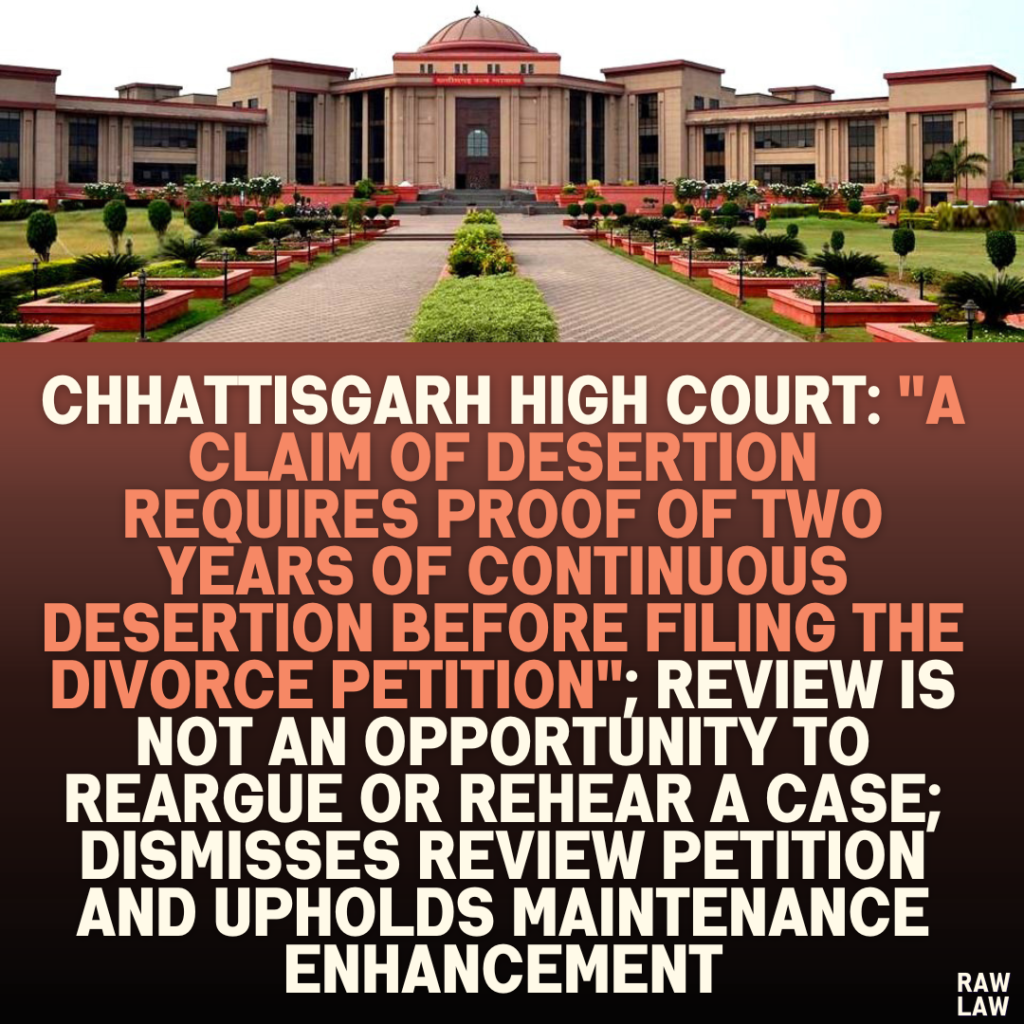Court’s Decision
The High Court of Chhattisgarh dismissed the review petition under Order 47 Rule 1 of the Code of Civil Procedure (CPC). It held that the petitioner could not establish any manifest error or significant miscarriage of justice in the earlier judgment. The Court emphasized that review is not an opportunity to reargue or rehear a case but is confined to correcting glaring omissions or errors that undermine the integrity of the judgment.
Facts of the Case
- The petitioner (husband) filed for divorce under Section 13(1)(i-a) and (i-b) of the Hindu Marriage Act, 1955, alleging cruelty and desertion by the respondent (wife).
- The family court granted the divorce on the ground of cruelty but did not address desertion.
- The wife appealed, and the High Court set aside the divorce decree, ruling that cruelty was not proven. The Court also enhanced the maintenance amount to ₹30,000 per month.
- The petitioner filed this review petition, claiming that:
- The ground of desertion was not considered, even though evidence supported it.
- Maintenance was enhanced without granting the petitioner an opportunity to address the issue.
Issues Framed
- Desertion: Whether the High Court erred in not considering the ground of desertion, which was part of the pleadings and evidence.
- Maintenance: Whether the enhancement of maintenance was justified without affording the petitioner an opportunity to present his case.
Petitioner’s Arguments
- Desertion:
- The petitioner argued that the wife deserted him in January 2012 and showed no intention to reconcile. He claimed that her actions demonstrated animus deserendi (intention to desert permanently), satisfying the conditions under Section 13(1)(i-b) of the Hindu Marriage Act.
- He contended that the Court erred by not considering this ground, even though the family court proceedings included evidence and arguments on desertion.
- He relied on Vithalbhai (P) Ltd. v. Union Bank of India (2005), asserting that premature suits should not be dismissed outright if they do not prejudice the opposing party.
- Maintenance:
- The petitioner argued that the maintenance enhancement to ₹30,000 per month was unjustified, as it was done without a proper hearing or specific pleadings.
Respondent’s Arguments
- Premature Filing:
- The respondent contended that the husband filed for divorce before the statutory two-year period of desertion was complete, rendering the claim unsustainable under Section 13(1)(i-b) of the Hindu Marriage Act.
- She argued that the family court granted divorce solely on the ground of cruelty, which she successfully challenged in appeal.
- Res Judicata:
- The respondent argued that the principle of res judicata barred the petitioner from revisiting the ground of desertion, as it was not raised in the original appeal.
- Maintenance:
- The respondent asserted that maintenance was justifiably enhanced considering inflation, the petitioner’s financial capacity, and her basic needs. She relied on T. Mohan Reddy v. Potu Krishnaveni (2010), which affirmed the discretionary power of courts to determine reasonable maintenance.
Analysis of the Law
- Ground of Desertion:
- Under Section 13(1)(i-b) of the Hindu Marriage Act, a claim of desertion requires proof of two years of continuous desertion before filing the divorce petition.
- The Court noted that the husband claimed desertion began in January 2012 but filed the divorce petition in January 2013, one year after the alleged desertion. This fell short of the statutory requirement.
- Premature Suits:
- The Court relied on Vithalbhai (P) Ltd. v. Union Bank of India (2005) to affirm that premature suits are not inherently invalid but can only proceed if they cause no prejudice. However, in this case, the premature filing did impact the respondent, rendering the claim of desertion unsustainable.
- Maintenance:
- The Court observed that the wife’s maintenance was initially set at ₹18,000 under Section 125 CrPC. Considering inflation and the husband’s remarriage, the enhanced maintenance of ₹30,000 was deemed reasonable and necessary to avoid multiplicity of proceedings.
Precedent Analysis
The Court referred to the following cases:
- Vithalbhai (P) Ltd. v. Union Bank of India (2005): Affirmed that premature suits could proceed under judicial discretion if no prejudice is caused.
- Ravi Khandelwal v. Taluka Stores (2023): Reinforced the principle that premature suits do not affect jurisdiction but should be adjudicated cautiously.
- T. Mohan Reddy v. Potu Krishnaveni (2010): Highlighted the court’s discretionary power to grant reasonable maintenance based on circumstances.
Court’s Reasoning
- Desertion:
- The petitioner filed the divorce petition prematurely, which disqualified the claim under Section 13(1)(i-b). The Court noted that the petitioner failed to amend the issues or seek relief on this ground during the trial, weakening his case.
- The family court granted the divorce solely on the ground of cruelty, which was overturned on appeal. The Court held that the petitioner’s attempt to resurrect the ground of desertion through a review petition was impermissible.
- Maintenance:
- The Court justified the enhancement of maintenance by considering the inflation rate, the wife’s financial needs, and the husband’s ability to pay. The Court emphasized that maintenance is a fundamental right, and its determination requires flexibility to address changing circumstances.
Conclusion
The review petition was dismissed as the petitioner failed to demonstrate any error apparent on the face of the record or significant injustice in the original judgment.
Implications
- The judgment reinforces the statutory requirements for claiming desertion under the Hindu Marriage Act.
- It underscores the limited scope of review petitions, emphasizing that they cannot serve as substitutes for appeals.
- The decision also highlights the Court’s commitment to ensuring fair maintenance awards, balancing the needs of the dependent spouse with the financial capacity of the paying spouse.
